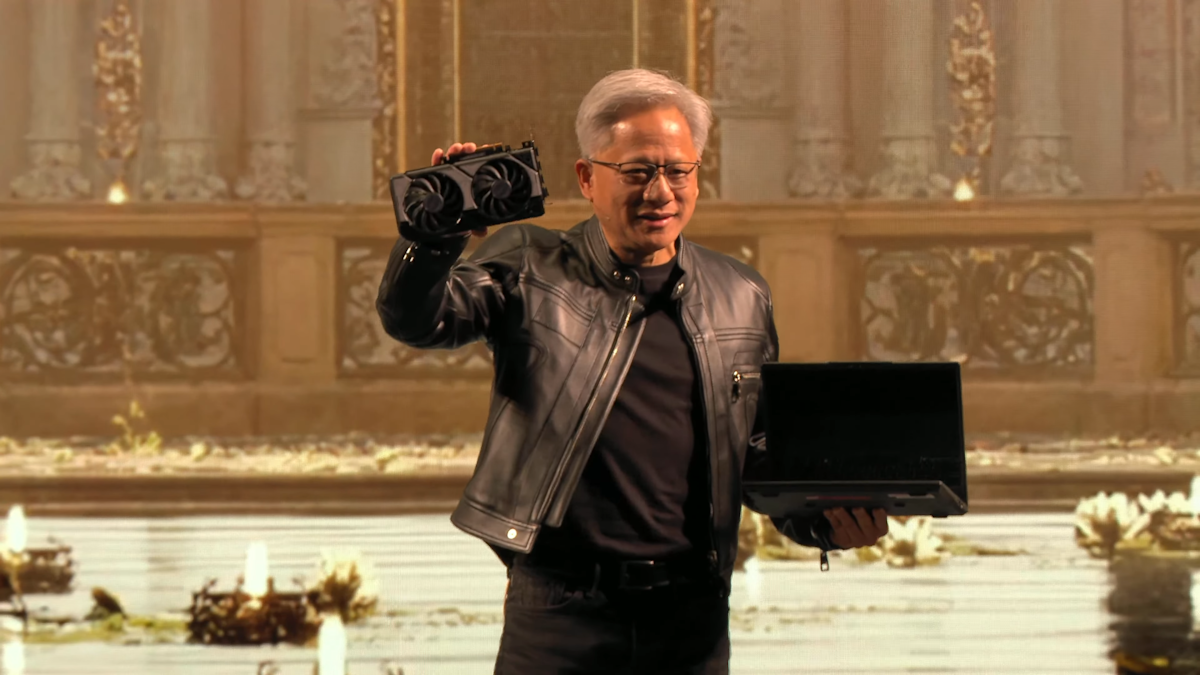Hold onto your controllers, gamers, because we’re about to dive into a debate that’s hotter than a new graphics card launch: Is PC gaming really 30 years old? Nvidia’s own CEO, Jensen Huang, recently made this bold claim, igniting a passionate firestorm in the gaming community.

The Bigger Picture

Jensen Huang’s statement, while perhaps intended as a simplified encapsulation of GeForce’s impact, reveals a larger narrative about Nvidia’s strategic approach to the PC gaming market. As the dominant force in GPUs, Nvidia has undeniably shaped the landscape of PC gaming, but it’s crucial to acknowledge the historical context within which this dominance emerged. Nvidia’s GeForce line, launched in 1999, certainly ushered in a new era of graphical fidelity and performance, but PC gaming had a rich and vibrant history before its arrival.

A Legacy Built on Collaboration
PC gaming’s evolution is a testament to the collaborative nature of the industry. From pioneering developers who pushed the boundaries of what was possible on early PCs to hardware manufacturers who tirelessly innovated, the platform’s success is a culmination of countless contributions. While Nvidia has undoubtedly played a pivotal role in recent decades, it’s essential to recognize that the foundation upon which GeForce built its success was laid by a diverse ecosystem of creators and technologists.
Shaping the Narrative: A Delicate Balance
Nvidia, as a leading industry player, wields significant influence in shaping the narrative surrounding PC gaming. While celebrating GeForce’s achievements is crucial, it’s equally important to maintain historical accuracy and acknowledge the contributions of others. A balanced and nuanced perspective is essential for fostering a healthy and inclusive gaming community.
Gamers React: A Cultural Perspective
The “Um, Actually” Phenomenon
The internet, with its lightning-fast speed and global reach, has transformed the way we consume and engage with information. This rapid dissemination of knowledge has also spawned a unique cultural phenomenon: the “um, actually” correction. While often perceived as pedantic or overly precise, this tendency to point out factual inaccuracies reflects a deep-seated desire for accuracy and a shared commitment to knowledge.
Gamer Culture and its Engagement with Industry Figures
PC gaming has cultivated a vibrant and passionate community of players who are deeply invested in the history, technology, and culture of the platform. This community is known for its engagement with industry figures, both positive and negative. While gamers often celebrate the innovations and achievements of companies like Nvidia, they are also quick to challenge inaccuracies or misleading statements, as evidenced by the response to Huang’s remark.
The Power of Collective Voice
The collective voice of the PC gaming community holds significant weight within the industry. When gamers raise concerns or challenge inaccurate information, it forces companies like Nvidia to take notice and address these issues. This dynamic highlights the importance of transparency and accountability within the gaming industry.
The Importance of Accuracy: Discussing the Significance of Historical Context in Gaming Discourse
Beyond Nostalgia: Understanding the Value of Historical Perspective
While nostalgia plays a significant role in shaping our perception of gaming’s past, it’s crucial to approach historical discussions with accuracy and nuance. Understanding the evolution of PC gaming requires acknowledging its diverse influences, from early arcade classics to groundbreaking software developers. A comprehensive understanding of gaming’s history allows us to appreciate the platform’s present and envision its future.
Setting the Record Straight
Inaccurate historical narratives can perpetuate misconceptions and undermine the achievements of those who paved the way for modern gaming. It’s essential to challenge these inaccuracies and ensure that the contributions of all stakeholders are recognized and celebrated.
The Ripple Effect of Misinformation
Even seemingly innocuous historical inaccuracies can have a ripple effect, influencing future generations’ understanding of gaming’s origins. It’s our responsibility to promote accurate and inclusive historical accounts that reflect the true diversity and richness of gaming’s past.
Moving Forward: Celebrating PC Gaming’s Rich History
Beyond the Controversy: A Celebration of PC Gaming’s Evolution
From Arcade to PC: Tracing the Journey of Gaming from Dedicated Machines to Personal Computers
The roots of PC gaming can be traced back to the golden age of arcades, where dedicated gaming consoles dominated the scene. However, the emergence of personal computers in the 1970s and 1980s presented a new frontier for gaming. Early PCs, while rudimentary compared to today’s machines, offered the potential for self-expression and user-created content, setting the stage for PC gaming’s unique evolution.
The Power of Innovation: Highlighting the Technological Advancements that Shaped PC Gaming
Throughout the years, PC gaming has been propelled by a relentless pursuit of innovation. From the introduction of the graphics processing unit (GPU) to the advent of high-definition textures and ray tracing, technological advancements have continuously redefined the boundaries of visual fidelity and gameplay experiences.
The Future of PC Gaming: Looking Ahead to the Next 30 Years and Beyond
The next 30 years promise even more groundbreaking advancements in PC gaming. Virtual reality (VR) and augmented reality (AR) are poised to revolutionize how we interact with games, while advances in artificial intelligence (AI) will create more immersive and responsive gaming experiences. As technology continues to evolve, PC gaming will undoubtedly remain at the forefront of innovation, captivating generations to come.
Conclusion
So, Jensen Huang, the titan of Nvidia, declared PC gaming to be 30 years old. A bold statement, definitely. But as we’ve explored, the truth is a bit more nuanced. While the modern PC gaming landscape owes much to the 1990s, its roots run far deeper, stretching back to the days of text adventures and rudimentary graphics. The article delved into the historical evolution of PC gaming, highlighting its diverse origins and the countless innovations that have shaped its trajectory.
This debate, while seemingly trivial, is actually a powerful reflection on how we perceive and define the evolution of an entire industry. It reminds us that technological advancements rarely occur in isolation, and that the legacy of PC gaming is woven from threads of innovation spanning decades. As we move forward, it’s crucial to acknowledge this rich history, not just to celebrate the achievements of the past, but also to inspire the next generation of developers and gamers. The future of PC gaming is bright, but it’s built upon the foundations laid by those who came before us.
Let’s leave the outdated definitions behind and embrace the true legacy of PC gaming: a constantly evolving, ever-innovative world that continues to push the boundaries of what’s possible.